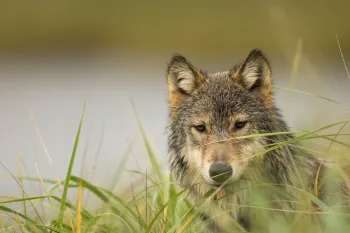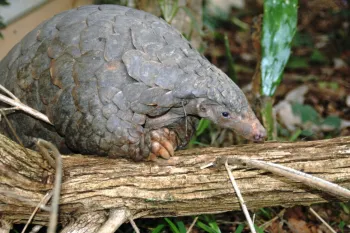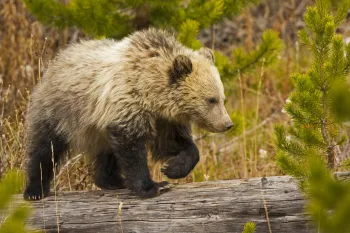MISSOULA, Mont.—A federal judge in Montana ruled today that the U.S. Fish and Wildlife Service broke the law last year when it denied a petition to protect gray wolves in the northern Rocky Mountains under the Endangered Species Act. The agency must now reconsider whether to grant protections to wolves living in Idaho, Montana and Wyoming, along with portions of Washington, Oregon and Utah.
The ruling comes in response to a lawsuit filed last year by the four conservation and animal protection groups who authored and submitted the petition in 2021: Humane World for Animals—formerly called the Humane Society of the United States, Humane World Action Fund—formerly called Humane Society Legislative Fund, the Center for Biological Diversity and the Sierra Club.
“Wolves are deeply intelligent, social animals who play an irreplaceable role in the ecosystems they call home,” said Kitty Block, president and CEO of Humane World for Animals. “Today’s ruling offers hope that we can restore protections to wolves in the northern Rockies, but only if the federal government fulfills its duty under the Endangered Species Act. These animals deserve protection, not abandonment, as they fight to return to the landscapes they once roamed freely.”
“Gray wolf recovery is at a crossroads in the western United States, so they should not be relegated to the crosshairs of the killing campaigns that pushed them to the brink of extinction," said Sara Amundson, president of Humane World Action Fund. “The U.S. Fish and Wildlife Service’s attempts to deny these animals much-needed federal protection betrays not only the letter of the law, but countless Americans who want to see wolves protected."
Ruling faults federal government
Today’s ruling from Senior District Judge Donald Molloy faulted the government for disregarding the potential for wolf recovery across Colorado and the rest of the southern Rocky Mountains including in most of Utah, northern New Mexico and northern Arizona.
Molloy found that the Endangered Species Act requires the Fish and Wildlife Service to consider the southern Rocky Mountains region and other portions of the wolf’s historical range. He also concluded that the agency unlawfully disregarded the potential importance of the wolf’s fledgling return to Colorado, through natural dispersal and historic reintroductions, when the agency denied the petition.
“With this court ruling comes the hope of true recovery for wolves across the West,” said Collette Adkins, carnivore conservation director at the Center for Biological Diversity. “The judge reasoned that the Fish and Wildlife Service’s unambitious view of recovery conflicts with the Endangered Species Act. Recovery requires return to places like the vast southern Rockies, where wolves once lived and can return, as long as they have the life-saving protections of the Endangered Species Act.”
Escalating state-driven threats to wolves
The conservation groups’ Endangered Species Act petition was filed amid escalating hostility toward wolves in several northern Rockies states:
- In Idaho, recent state law changes authorize the state to hire private contractors to kill wolves, allow hunters to purchase an unlimited number of wolf-killing tags and permit hunters to kill wolves by chasing them down with hounds and all-terrain vehicles. Along with Montana, the state allows bounties as “reimbursements” for dead wolves.
- Recent changes in Montana state law allow wolves to be killed using bait and strangulation snares, and recently proposed regulations, if finalized, would allow a single hunter to kill 15 wolves and trap an additional 15.
- Across most of Wyoming, wolves are designated as “predatory animals” and can be killed without a license in nearly any manner and at any time. Hunters in Wyoming have killed several wolves just a few miles from the border with Colorado, where wolves are finally returning to the state through dispersals and a restoration effort.
“Wolf recovery is dependent on responsible management by the states, and Idaho, Montana and Wyoming have shown that they’re grossly unsuited to manage the species,” said Nick Gevock, Sierra Club Northern Rockies campaign strategist. “Judge Molloy’s ruling means now the U.S. Fish and Wildlife Service must go back to the drawing board to determine whether federal management is needed to ensure wolves survive and play their vital role in the ecosystem.”
Today’s ruling vacates the Fish and Wildlife Service’s denial of the petition, and the agency must now reconsider its response. The agency has 60 days to appeal the decision.
The plaintiffs in the lawsuit are represented by attorneys at the Center for Biological Diversity and Humane World for Animals’ Animal Protection Law department.



